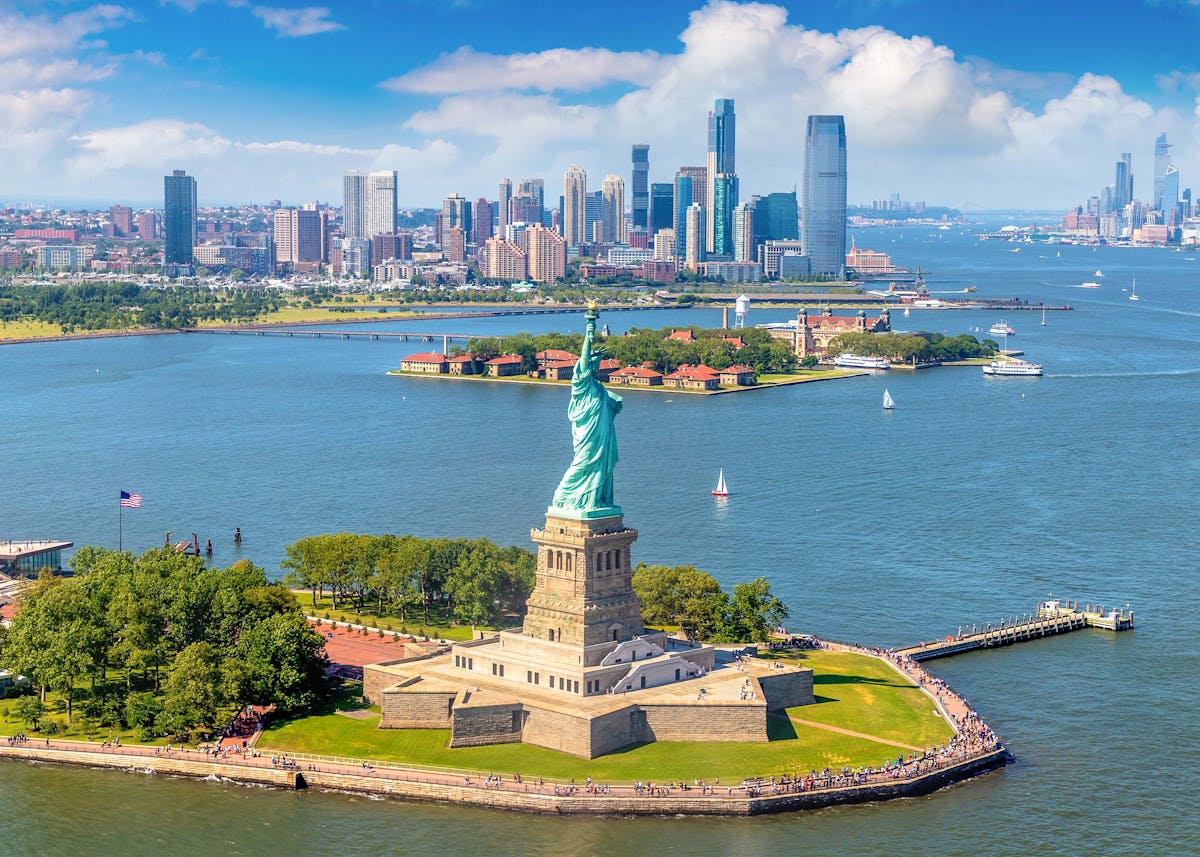Liberty Island is located in Upper New York Bay and is home to the famous Statue of Liberty. In addition to the statue, you can explore the Statue of Liberty Museum which features the statue's original torch, and other smaller attractions within the island. The island was once called Bedloe's Island, but in 1956, it was officially renamed Liberty Island by the U.S. Congress. Though part of New York State, it is geographically surrounded by the waters of Jersey City, New Jersey, and is also considered part of Manhattan.
Liberty Island - In a Nutshell
Handy information
| ⏰Opening hours: | 9am to 5pm |
| 📍Last ferry: | 5pm from Liberty Island |
| ⛴️Closest ferry point: | Battery Park & Liberty State Park |
Things to know
Year of official name: 1956
Location: Upper New York Bay
UNESCO World Heritage Site: Monday: 9 am - 5 pm (Last entry: 4:30 pm)
Height: 305 feet
Visitors per year: 4 million
Recommended tickets to Liberty Island
History of Liberty Island

17th Century
Dutch settlers named the islands (now Liberty, Ellis, and Black Tom) "Oyster Islands" due to an abundance of oyster beds that sustained the area for nearly 300 years.
1664
The British took control, and the island was granted to Captain Robert Needham, who sold it to Isaac Bedloe in 1667.
1732
The island was sold to New York merchants Adolphe Philipse and Henry Lane and briefly used as a smallpox quarantine station.
1746
Archibald Kennedy bought the island, added a summer residence and a lighthouse. By 1753, it was known as "Bedloe's Island."
1884
The Statue of Liberty was completed in France, and after delays, its pedestal was finished in 1886.
1886
The Statue of Liberty was unveiled by President Grover Cleveland on October 28.
1956
The island was officially renamed Liberty Island by Congress.
What to see at Liberty Island

The Statue of Liberty, designed by Frédéric Auguste Bartholdi and gifted by France in 1886, stands as a symbol of freedom and democracy. Located on Liberty Island, this colossal statue is one of the most iconic landmarks in the world, representing hope and opportunity for millions of immigrants.

Opened in 2019, the Statue of Liberty Museum offers visitors an immersive experience into the history, construction, and symbolism of the Statue of Liberty. It features exhibits, including the statue's original torch, interactive displays, and historical artifacts, allowing visitors to explore the legacy of Lady Liberty.

The Sculpture Garden at Liberty Island complements the grandeur of the Statue of Liberty. Over here, the statues of Edouard de Laboulaye, Frédéric-Auguste Bartholdi, Alexandre-Gustave Eiffel, Joseph Pulitzer, and Emma Lazarus can be found as they were involved in the design, construction, and lasting legacy of the Statue of Liberty.

Fort Wood is the star-shaped fort that serves as the foundation for the Statue of Liberty's pedestal. Built in the early 19th century to defend New York Harbor during the War of 1812, it remains an important historical structure and supports the monument's towering presence on Liberty Island.

The Pedestal of the Statue of Liberty, completed in 1886, elevates the statue, adding to its impressive height. Designed by architect Richard Morris Hunt, the pedestal offers visitors panoramic views of New York Harbor. Inside, there are exhibits detailing the statue's construction and its enduring significance.

